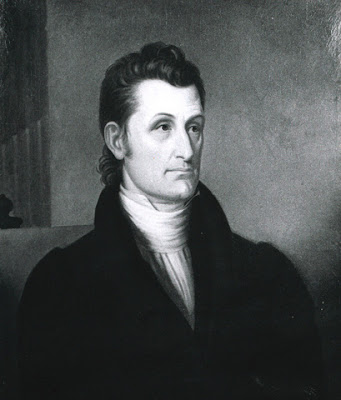Jane Peck (sometimes called Jenny) married Archibald Campbell in Jefferson County, Tennessee on August 9, 1806. She was the daughter of Adam Peck and Elizabeth Sharkey who came from Virginia in 1788 to Mossy Creek (now called Jefferson City), Tennessee. My Campbell relatives were living in the Dandridge and Greene area at the time. The government wanted the people of Virginia to move west and build up this country.
Adam Peck served as an ensign in the Maryland line of the Revolutionary War. He was a member of the House, and 1st & 2nd Assemblies from 1796-1799. As a member of the the 1st Assembly of the state, he helped draft the Constitution of the State of Tennessee.
On my way to Georgia a few weeks ago, I stopped at Westview Cemetery, Jefferson City, Tennessee and took a picture of his bronze monument below. Jacob and William Raine Peck is also buried there.
Adam Peck and his wife Elizabeth set up house in an abandoned fort or blockhouse beside a spring until their own cabin was built. By 1797 between 75-100 families settled within a four mile radius of Mossy Creek. My Campbell family was one of them. Then children came into the picture.
One was a son named Jacob Peck. Jane (who married Archibald Campbell) is Jacob's sister and my 5 x's great grandmother. Jacob was judge of the Supreme Court of Tennessee from 1822-1835 and prior to that in 1821 he was state senator for Greene and Jefferson counties in Tennessee. Afterwards Jacob Peck and Daniel Ashmore were granted a patent on a machine for cutting and collecting the heads of grain and grasses. (See the Journal of the Franklin Institute of the state of Pennsylvania, Thomas P. Jones.) Judge Peck was one of the founders of Emory and Henry College in Emory, Virginia.
I found a picture of him on line and I must say, he was a very handsome man.
 |
| Check Geni.com for the image of Jacob Peck. |
Jacob married Sophia Talbot and their family grew. They had a son named William Raine Peck.
He was born in rural Mossy Creek in Jefferson County, Tennessee. I read several publications that said his height ranged from 6 foot 2 inches to 6 foot 8 inches tall with a body mass to match, almost mythical in dimensions. A giant of a man in the days when people were considerably shorter. William Raine Peck came from a line of men that had political power in the founding of this country after the Revolutionary War. When he was young William bought a plantation across the Mississippi River from Vicksburg, Mississippi. His plantation prospered and he became one of the wealthiest men in the region due to his "free labor". As I researched his life I was amazed at the number of slaves that he owned. Some of which were Mulatto. According to the 1850 Slave Schedule for Madison Parrish, Louisiana he owned 45 slaves and in 1860 the number jumped to 53. It is estimated that he made approximately $30,000 a year from the plantation.
 |
| Picture from Wikipedia |
Around 1861 William enlisted as a private in the 9th Louisiana Infantry. He was sent to Virginia but arriving too late for any participation in the battle that had been in the area.
During the Gettysburg Campaign he was involved with the Battle of Winchester and the Battle of Gettysburg. At this time he was promoted to captain and then on to a lieutenant in a short amount of time. On October 8, 1863 Peck was promoted to colonel of the 9th Louisiana to succeed Leroy A. Stafford. He lead the regiment in the battles of the Wilderness, Spotsylvania, and Cold Harbor during the Overland Campaign. Due to a thigh injury in 1864 he was out of commission for a while. Peck returned to the battlefield in December of 1864 and in February of 1865 he was promoted to Brigadier General. On June 6th the same year he was paroled.
After the war, William returned to Louisiana and continued running his plantation with much success. However he had to sign a Confederate Application for Presidential Pardon swearing that he will faithfully support all laws and proclamations, including the emancipation of slaves. This come at a cost to him. But no more dear than the lives he held captive for decades serving him for free. He died at the tender age of 52 and Peck's remains were sent back to Tennessee to be buried along side other members of his family.




No comments:
Post a Comment
http://www.blogger.com/posts.g?blogID=6590297267502949744